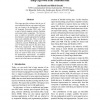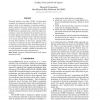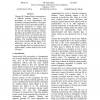32 search results - page 5 / 7 » Discriminative Pruning of Language Models for Chinese Word S... |
ACL
2008
13 years 8 months ago
2008
This paper presents a new unsupervised algorithm (WordEnds) for inferring word boundaries from transcribed adult conversations. Phone ngrams before and after observed pauses are u...
NLPRS
2001
Springer
13 years 11 months ago
2001
Springer
Word segmentation is the first and obligatory task for every NLP. For inflectional languages like English, French, Dutch,.. their word boundaries are simply assumed to be whitespa...
ACL
2008
13 years 8 months ago
2008
This paper provides evidence that the use of more unlabeled data in semi-supervised learning can improve the performance of Natural Language Processing (NLP) tasks, such as part-o...
INTERSPEECH
2010
13 years 2 months ago
2010
This paper describes a new toolkit - SCARF - for doing speech recognition with segmental conditional random fields. It is designed to allow for the integration of numerous, possib...
COLING
2002
13 years 7 months ago
2002
Chinese NE (Named Entity) recognition is a difficult problem because of the uncertainty in word segmentation and flexibility in language structure. This paper proposes the use of ...



